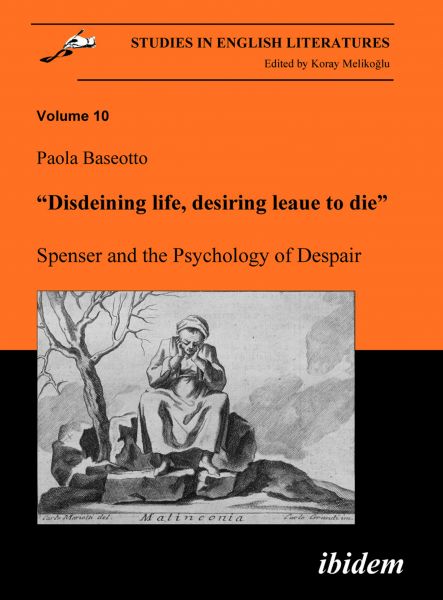“Disdeining life, desiring leaue to die”. Spenser and the Psychology of Despair
Paola Baseotto’s important study stresses death’s ubiquity as a concept in Spenser’s works, always present in intimate relation to life, whether in the recurring, disturbing, figures of “deathwishers,” characters who seem to belong as much to the dead as the living, or as a perspective, challenging both characters and readers, to reassess their own apprehension of death and the way in which it shapes our lives. Baseotto’s analyses of Spenser’s “deathwishers” and “living dead” focus our attention on some of the most compelling and distinctive images in Spenser’s work, illuminating our understanding of their power and significance through a combination of detailed attention to language and context, and a thoroughly informed understanding of contemporaneous religious ideas and attitudes. Through close and sensitive study of Spenser’s writing from The Shepheardes Calender, through The Faerie Queene, to such little discussed poems as The Ruines of Time and Daphnaida in Complaints, Baseotto establishes the centrality, the subtlety and the distinctiveness of Spenser’s figuring of death. Baseotto’s study offers us a new and illuminating understanding of an aspect of Spenser’s writing that is fundamental, but which has been strangely neglected in recent decades. – Elizabeth Heale (Senior Lecturer, University of Reading)Author of The Faerie Queene: A Reader’s Guide (Cambridge University Press, 1987, 1999) and Autobiography and Authorship in Renaissance Verse (Palgrave, 2003).Exhaustive and succinct, rigorous and readable, Baseotto examines Spenser’s obsession with death, and shows us what a remarkable, independent and surprisingly modern sensibility he had. Here is a Spenser who engages our sympathies with unexpected intensity.– Tim Parks (Lecturer, IULM University, Milan) Novelist and frequent contributor to the New York Review of Books.
Paola Baseotto holds a Ph.D. from the University of Reading (UK) and teaches English at the University of Insubria (Como, Italy). Her research interests centre mainly on the works of Edmund Spenser and on theological, legal and medical tracts of the Renaissance period. She is the author of articles for academic journals and of the volume Fighting for God, Queen and Country: Spenser and the Morality of Violence (2004) and has presented papers at international conferences in England, France and Portugal.
Versandkostenfreie Lieferung! (eBook-Download)
Als Sofort-Download verfügbar
- Artikel-Nr.: SW9783838255675450914
- Artikelnummer SW9783838255675450914
-
Autor
Paola Baseotto
- Mit Koray Melikoglu
- Wasserzeichen ja
- Verlag ibidem
- Seitenzahl 194
- Veröffentlichung 10.02.2012
- Barrierefreiheit
- Keine Angabe: Keine Informationen zur Barrierefreiheit bereitgestellt
- ISBN 9783838255675
- Mit Koray Melikoglu

